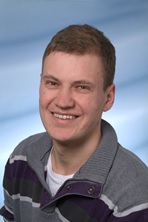 Large-scale methane measurements on individual ruminants for genetic evaluations
Large-scale methane measurements on individual ruminants for genetic evaluations
Georg Terler

Tell us about yourself (Who are you? Where are you from? What is your educational background?)
My name is Georg Terler (age: 27) and I live in Styria, a federal state of Austria. I grew up on a farm and thus I have been interested in agriculture from the first days of my life. I graduated Agricultural High School in Raumberg-Gumpenstein and afterwards I studied Agricultural Sciences and Livestock Sciences at the University of Natural Resources and Life Sciences in Vienna. After finishing my master’s programme I returned to Austrian Research and Education Center Raumberg-Gumpenstein to work at the Institute of Livestock Research.
What is your area of expertise?
The field I am researching in is cattle production. In our experiments at AREC Raumberg-Gumpenstein we not only focus on milk or meat production but also examine quality of feedstuffs and animal products as well as environmental impacts of cattle production systems. In the next years methane emissions from ruminants will be the main topic of my work.
Where does your focus lie within your current project(s)? (related to methane)
Currently we are just installing two respiration chambers and we are confident, that we can start our first project on methane emissions in spring 2016. In this project the impact of different genotypes of cows and different feeding strategies on methane emissions in respiration chambers should be examined. Due to the fact, that this experiment is a part of a comprehensive project, in which different production systems are compared, data from methane measurements should be linked with production data ( e.g. milk yield) to enable an evaluation of economic and ecological efficiency of these production systems.
What would be the added value for you of joining an international researchers network? (such as the METHAGENE network)
In Austria AREC Raumberg-Gumpenstein is the only institution that conducts measurements of methane emissions in cattle. For the verification of results it is necessary to have comparable data from other institutions. For this reason it is important for me to have contacts in other countries, where methane measurements are carried out. International cooperation and exchange will also be necessary in case of further development of the respiration chamber method.
What and/or who inspired you to make a career in science?
I am very interested in nature and the function of natural systems. Due to my childhood on a farm I got a close relationship to cattle. Thus I want to contribute to understand natural processes which occur in ruminants and so I like to work in agricultural research. I wrote my master thesis about an experiment at AREC Raumberg-Gumpenstein, where I got to know Dr. Leonhard Gruber (head of institute), who inspired me to join his institute and work there as a scientist.
What do you enjoy most about your work?
I enjoy that I can work in a common environment that I know since my childhood: I work on a farm. In addition I can contribute to further development of cattle production systems by performing experiments and extending the knowledge about impact factors on farm efficiency. So I can help farmers to optimize their production system and to manage their farm in an economically and ecologically efficient way.
What is your most stand-out or surprising moment in science so far?
It is surprisingly for me, how sensitive the production system “ruminant” is. Minor changes in breeding, feeding or housing of cattle can have a great impact on condition and productivity of animals, quality of foods or environmental aspects.


